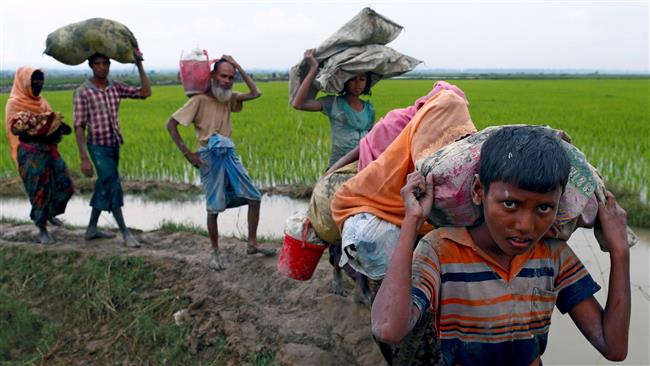
RNA - The Malaysian premier made the remarks while speaking with journalists at the Subang Airforce base on the outskirts of the capital Kuala Lumpur on Saturday. He said based on reports received by Malaysian authorities, the desperate Rohingya Muslims were being discriminated and “no mercy is accorded to them” back in their home country.
“Actually, it is done in a planned manner so that they are tortured, discriminated, killed and raped,” he said.
Earlier in the day, Malaysia sent two air force cargo planes, loaded with food and medicine supplies, to the port city of Chittagong in southeastern Bangladesh, where nearly 300,000 Rohingya Muslims have taken refuge during the past two weeks.
“We are sending two planes with biscuits, rice and soap. Malaysia will do whatever it can to help since this is a huge disaster,” the Malaysian prime minister told reporters.
Back in February, Malaysia sent a cargo ship containing 2,300 tons of aid, including food, medical supplies, and clothing, to Myanmar’s Thilawa port to be delivered to the Rohingya.
Predominantly Muslim Malaysia on Tuesday even summoned Myanmar's envoy to Kuala Lumpur to express its “deep concern regarding the escalation of violence” against the Muslim minority in Myanmar.
Rohingya Muslims fleeing violence and persecution in their home country of Myanmar continue to arrive in Bangladesh. Refugees are waiting for hand-out from aid agencies since they lack food, clean water and shelter. Locals say many of the Rohingya refugees are also sick and wounded. Thousands of the displaced people have been stranded or left without enough food for weeks.
Myanmar’s leader Aung San Suu Kyi is under fire by the international community and rights groups for allowing the government troops and the Buddhist mobs to further impose a violent clampdown on the desperate minority.
Suu Kyi, who was awarded the Nobel Peace Prize in 1991, is also heavily criticized by a number of her fellow Nobel laureates, including Malala Yousafzai and Desmond Tutu, for allowing such atrocities against the Rohingya.
Earlier in the week, peace activists launched an international campaign, calling on the Nobel Peace Prize Committee to take back Suu Kyi’s prize over her complicity in what is viewed as the ethnic cleansing of Rohingya Muslims in the Buddhist-majority Myanmar.
Olav Njolstad, the head of the Norwegian Nobel Institute, however, said on Friday that the prize awarded to Suu Kyi cannot be revoked.
“It is not possible to strip a Nobel Peace Prize laureate of his or her award once bestowed. None of the prize awarding committees in Stockholm and Oslo has ever considered revoking a prize after it has been awarded,” he said.
Meanwhile, Human Rights Watch warned that violence by Myanmar's army against the Rohingya had all the hallmarks of a campaign of “ethnic cleansing,” calling on the UN Security Council to hold an emergency meeting on the issue.
A new wave of violence broke out on August 25 after dozens of police and border outposts in the state of Rakhine came under attack purportedly by a group claiming to be the defenders of the Rohingya. The alleged assaults were launched in response to a government clampdown in the area, where over a million Rohingya are based.
Since then, counteroffensives by Myanmar’s army have killed at least 400 people, burned thousands of houses, razed a large number of villages and depopulated vast swathes of land in Rakhine. However, Suu Kyi has dismissed the Rohingya crisis as a misinformation campaign, rejecting the occurrence of any clampdown on the minority.
The volatile Rakhine, located northwest of Myanmar, has been the scene of communal violence since 2012. Many of the Muslims have lost their lives while tens of thousands have been displaced as a result of attacks by Buddhists. The refugees largely live in camps in dire conditions.
Rakhine has also been under a military siege since October 2016, when the government used a purported deadly militant attack on border guards back then as a pretext to enforce the siege. There have been numerous eyewitness accounts of summary executions, rapes, and arson attacks by security forces against the Muslims since the crackdown began.
The UN has already described Rohingya Muslims as the “most persecuted minority group in the world.”
Myanmar’s government denies full citizenship to the Rohingya, branding them illegal immigrants from Bangladesh. Dhaka, in turn, regards the desperate refugees as Myanmarese and harshly pushes them back. The Rohingya, however, track their ancestors many generations back in Myanmar.
847/940